
Product
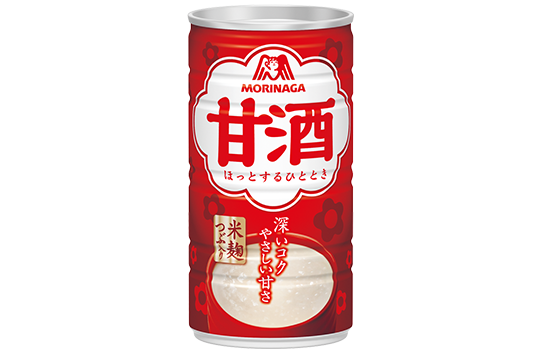
Amazake 190g
Making its debut in 1974 as a canned drink, this Morinaga favorite has been a popular choice in Japan for generations.
Blended with select high-quality sake lees and kome koji (rice culture), this amazake has a deep yet refreshing taste.
The koji grains add an extra element of mouthfeel, making it even more delicious.
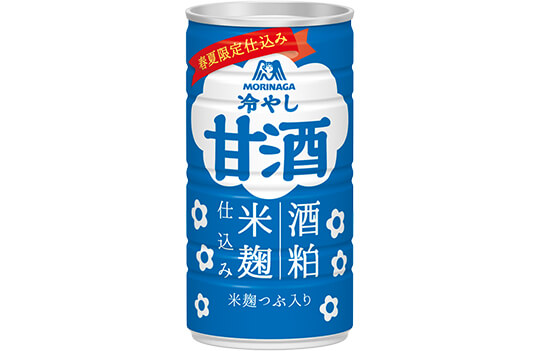
Ice Amazake 190g
Blended with carefully sourced local sake lees and rice malt, this amazake has a deep yet refreshing taste.
Enjoy the rich and sweet flavors of sake lees, rice malt and kuro-mitsu (brown sugar syrup) in harmony.
Since its debut in 2000, this limited edition brew has been loved by many.
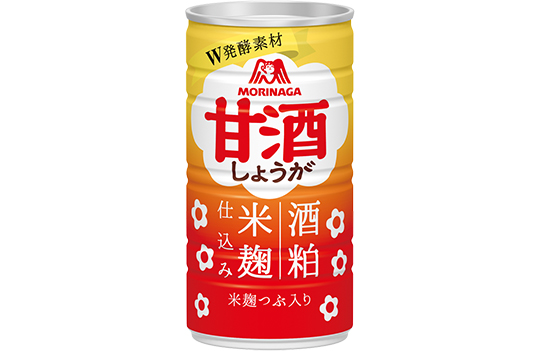
Amazake (Ginger flavor) 190g
Sweet amazake made from carefully sourced local sake lees, rice malt and with a pinch of ginger for a spicy kick. Drink cold as a refreshing drink or heated to stay warm this winter, and enjoy the rich and distinct flavors of rice lees, malt and ginger in harmony.
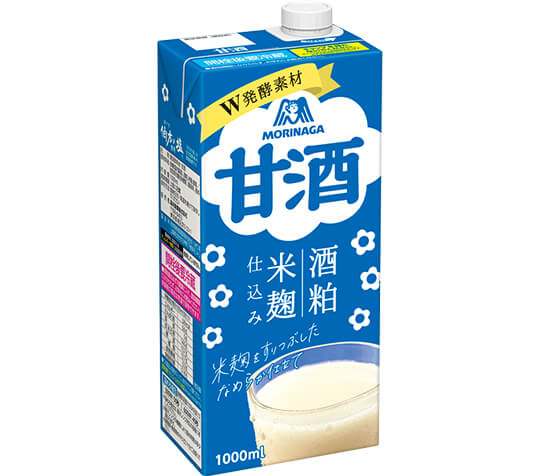
Amazake 1000ml
A one-liter bottle of sweet amazake made from carefully sourced local sake lees and rice malt.
Finely grounded rice malt gives this drink a smooth flavor and finish, while the sake lees give it a delicate and comforting sweetness.
This size is best recommended for lovers of amazake.
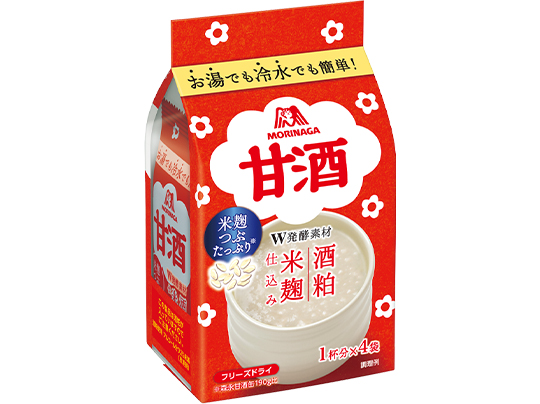
Amazake Freeze-Dry 4 pack
Blended with select high-quality sake lees and kome koji (rice culture), this special edition amazake is frozen and dehydrated to seal in all the well-balanced flavors.
Simply melt the freeze-dry pack using hot or cold water and you can enjoy the authentic taste of amazake anywhere, anytime!
Sold either individually or in a set.
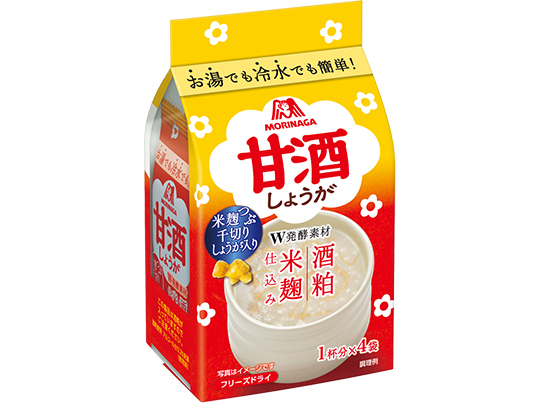
Amazake Freeze-Dry (Ginger flavor) 4 pack
A new brewing process has made it possible to create an amazake concentrate that has all the sweetness and richness of your freshly-made drink. With added ginger to give it a kick and bring out the natural sweetness of the sake lees and rice malt. Simply pour cold or hot water and serve.
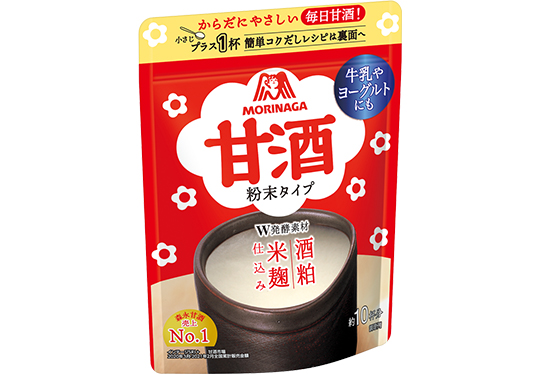
Amazake (Fine powder type) 100g
This finely powdered amazake dissolves quickly and easily in cold or hot water. Enjoy the natural sweetness of sake lees and rice malt with a spoonful of milk or yogurt for extra richness. Drink, mix or incorporate into your cooking.
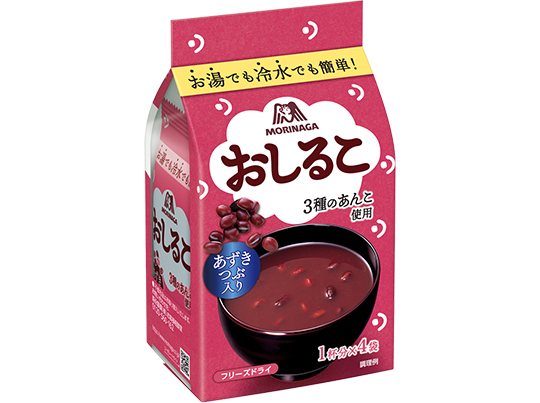
Shiruko (4 bags)
Freeze-dried shiruko syrup that easily dissolves in hot or cold water. Made from real adzuki beans for an authentic taste. Also available in individual servings.
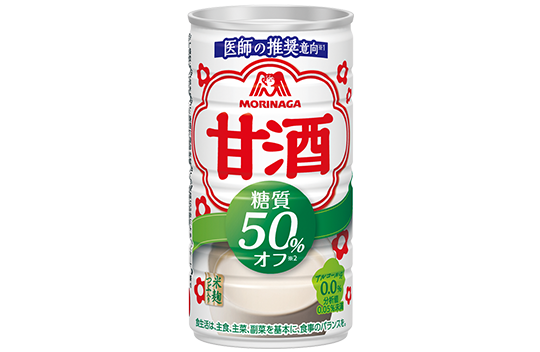
Chilled Amazake (125ml)
Sweet amazake made from carefully sourced local sake lees and rice malt, rich in flavor but refreshing and easy to drink. Free of any acidifiers or artificial flavors. Recommended for lovers of amazake. Better served chilled.
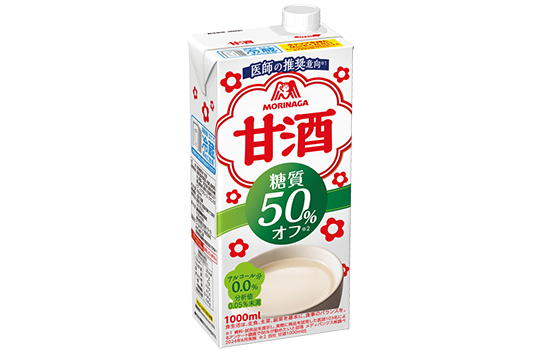
Chilled Amazake 1000ml
A one-liter bottle of sweet amazake made from carefully sourced local sake lees and rice malt, rich in flavor but refreshing and easy to drink. Free of any acidifiers or artificial flavors. Recommended for absolute lovers of amazake. Best served chill. This new bottle is easier to hold with fewer chances of splashing when pouring.
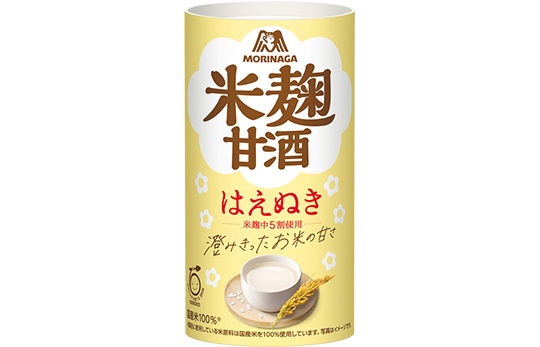
Kome koji Amazake 125ml
Made using only kome koji (rice culture) and salt, this drink has a mild aroma with a natural sweetness.
ABV (alcohol by volume) 0.00%. Appropriate for all ages, including children, and pregnant or breastfeeding women.
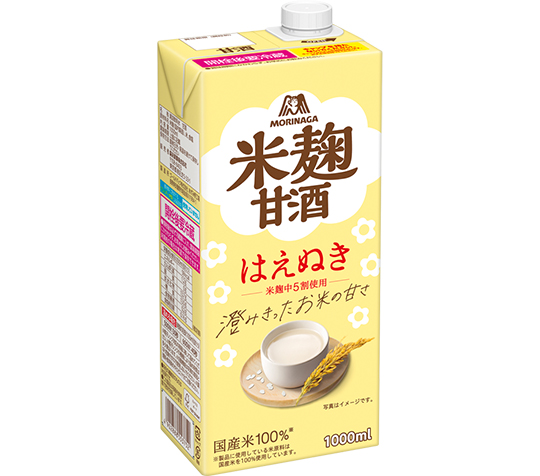
Kome koji Amazake 1000ml
A one-liter bottle of Morinaga's malted rice amazake, which features the natural sweetness of sake lees and rice malt. With a smooth and refreshing taste that's easy to incorporate into your daily routine. This drink contains no alcohol and can be enjoyed by children, expecting and nursing mothers alike.
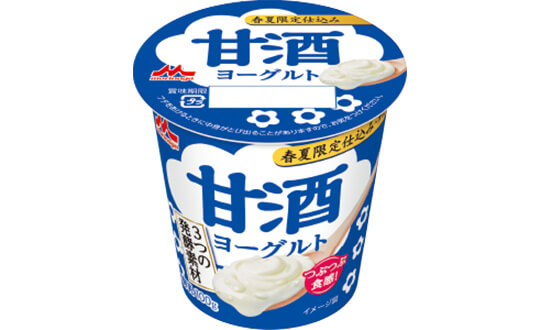
Amazake-flavored Yoghurt Spring and Summer Limited Edition 100g
This yogurt is a collaboration featuring Morinaga's Ice Amazake with a delicious taste of rice malt, sake lees and yogurt. Enjoy the texture and flavor of rice with the complimentary richness of milk.
Allergen Information
Morinaga Amazake does not include the ingredients below:
- <Ingredients>
- Egg, Milk, Wheat, Shrimp, Crab, Soba, Peanuts
- <Items to above ingredients>
- Abalone, Squid, Salmon Egg, Orange, Kiwi, Beef, Walnuts, Salmon, Mackerel, Soybean, Chicken, Banana, Pork, Matsutake, Peach, Sweet Potato, Apple, Gelatin, Sesame, Cashew Nuts
*Equipment used to produce Amazake Freeze-Dry product is also used to produce products containing eggs, milk, wheat, shrimp or crab.
Fun Facts

What is Amazake?
Amazake is a traditional beverage made from rice that has been consumed by Japanese people since the ancient Nara period (710-794).
It is produced in a variety of ways that changes depending on the region in Japan. Some regions make amazake by melting sake lees and sugar together, while some use rice bran kome koji.
Morinaga Amazake is an exquisite blend of sake lees and kome koji, which has made it popular across Japan.
Is Amazake a Kind of Sake?
All amazake products have an ABV of less than 1% so it is not an alcoholic drink. It is a traditional Japanese soft drink which can be consumed without worry.
*Despite having an ABV less than 1%, please proceed with caution when consuming amazake products that include sake lees, especially those sensitive to alcohol, children, pregnant and breastfeeding mothers.
History of Amazake
Amazake has a rich history that can be traced back to the Kofun era of Japanese history.
Recorded in an ancient Japanese book called Nippon Shoki, a drink called Ama no Tamuzake was mentioned and this is considered to be the origin of modern amazake.
During the Heian period (794 - 1185 AD) amazake was commonly drunk by the nobles, but it wasn't until the Edo period (1603 - 1868 AD) that amazake had spread widely to the public. In the Edo period, amazake sellers carried their products on a pole on their shoulders as they touted their wares to common people.
Amazake became popular as it was said that it can strengthen a constitution weakened by the severe heat of summer.
The price of amazake has always been kept low to make it accessible to more people. As amazake is thought to improve a weakened body, it's considered an effective hangover cure. It was even recognized as a health food by the Shogun in the Bakufu era. Since then, amazake has become synonymous with summer.
The Happy Secrets of Kome Koji and Sake Lees
There are two fermented ingredients used in Morinaga Amazake
Amazake - a traditional Japanese fermented beverage that is beneficial for your body.
We strongly recommend Amazake to those who'd like to maintain a healthy constitution.
Did you know there are two types of amazake - amazake made using kome koji, and amazake made with sake lees?
These ingredients are the reason why amazake is also known as "the drinkable IV drip" or "the drinkable nutrition solution".
Let's look at both ingredients: kome koji and sake lees.
Kome Koji Production Process
- 1Rice
- 2Steam
- 3Steamed Rice
- 4Add koji mold
- 5Kome koji produced
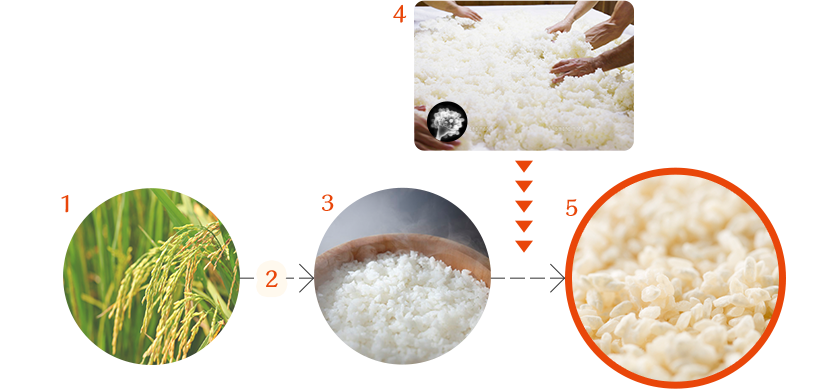
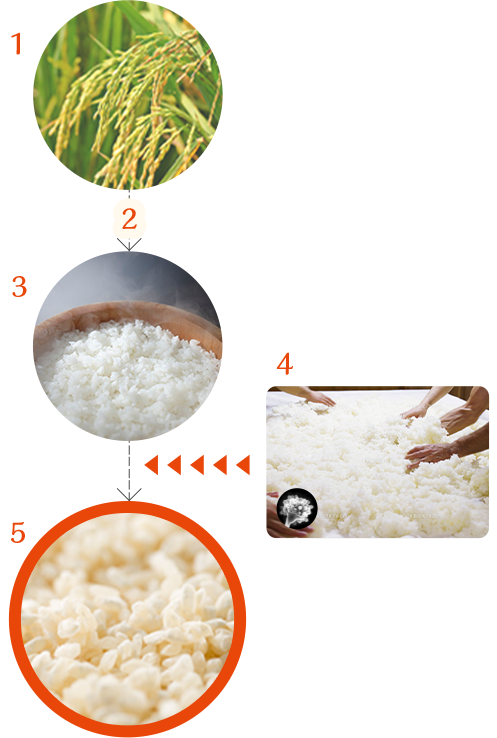
Secret of Kome koji
Kome koji is made from steamed rice with koji mold (rice culture) added to it. Most traditional Japanese food or ingredients, including amazake sake, mirin (cooking sake) and miso paste - to name a few - are made using fermented kome koji.
Kome Koji Nutritional Composition
Vitamin B complex, Folic acid, Pantothenic acid, Biotin, Niacin
Kome Koji "Happy" Facts
- The fermentation process of kome koji creates vitamins
- The fermentation process also transforms the starch in the rice into glucose or oligosaccharides, and thus a natural sweetness is created
- … And much more!
Sake Lees Production Process
- 1Rice
- 2Steam
- 3Steamed Rice
- 4Add koji mold
- 5Fermentation by koji mold
- 6Kome koji is produced
- 7Add yeast
- 8Unrefined sake
- 9Sake Lees is produced
- ※Double fermentation
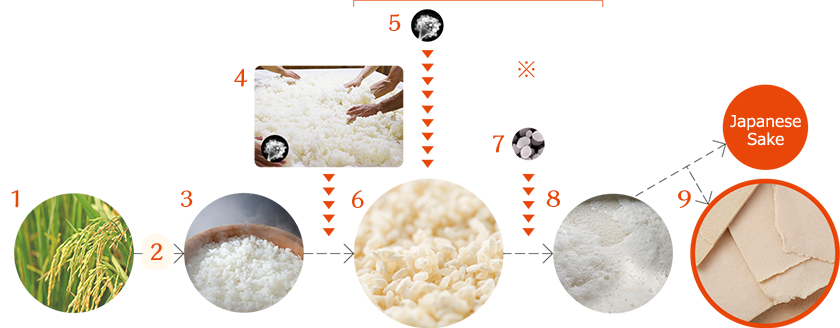
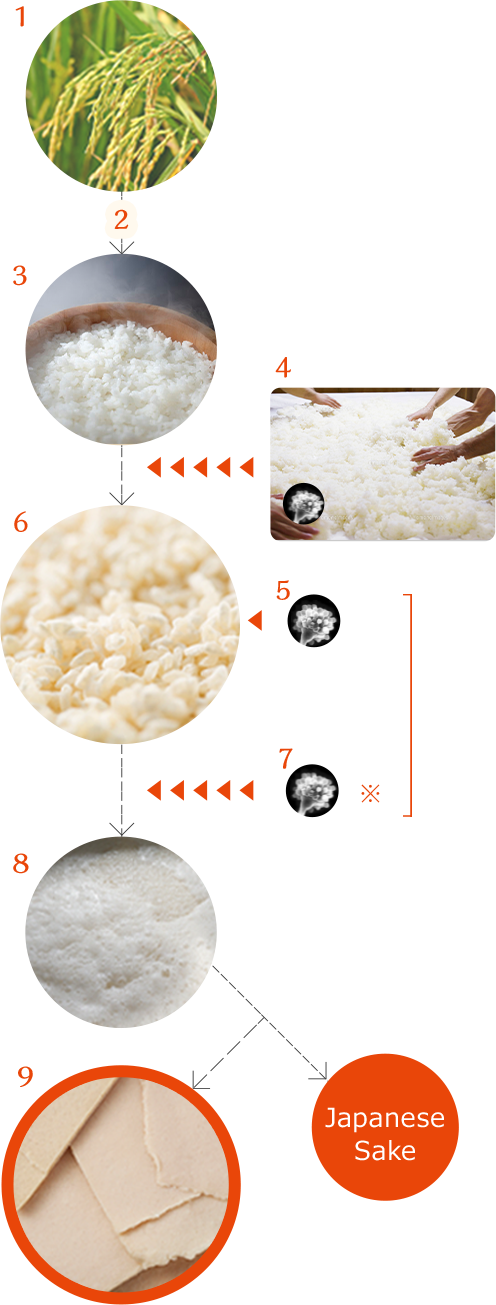
Secret of Sake Lees
Sake lees are made by adding yeast into fermented kome koji. The mold and yeast together create a "double fermentation" effect which condenses a variety of nutritional components. It features a mellow aroma and a rich taste.
Sake Lees Major Nutritional Compositions
Protein, carbohydrates, dietary fiber, vitamins, organic acid, mineral, amino acid, B-glucan, Folic acid
Sake Lees "Happy" Facts
- Sake lees are one of the by-products created during the process of producing Japanese sake. The "double fermentation" power of mold and yeast produces a high nutritional value.
- In addition to proteins, dietary fibers, vitamins and minerals, etc., peptides and amino acids are produced by the fermentation process. β-glucan and folic acid from bacilli and yeast are also contained in sake lees.